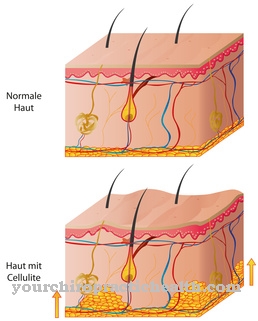Acute kidney failure (ANV) can be a life threatening condition. Fatigue, discolored urine and water in the legs - hardly anyone worries about their health with these symptoms.
What is acute kidney failure?

Acute kidney failure is the rapid deterioration in the function of one or both kidneys. This can happen within a few hours to days. In acute kidney failure, the kidneys no longer properly filter the person's blood.
Little or no urine is produced and the body is downright poisoned from the inside. If the acute kidney failure is not treated, life is threatened. In the beginning, the symptoms of acute kidney failure are unspecific and not recognizable to the layperson: tiredness, small amounts of urine or nausea.
Later on, in acute kidney failure, water retention in the legs, shortness of breath and cardiac arrhythmias occur. In severe cases, pulmonary or brain edema can develop. This can lead to a coma.
causes
Acute kidney failure is not a disease in itself. It is a consequence of serious underlying diseases, such as cardiovascular diseases or circulatory disorders of the kidneys. Acute kidney failure is caused by a sudden drop in blood pressure. The blood flow to the kidneys is also often disturbed.
X-ray contrast agents, antibiotics or ACE inhibitors can be to blame for this. Acute kidney failure can also occur as a result of blood and fluid loss during accidents or surgery. Inflammation and infections with viruses or bacteria can also cause acute kidney failure.
Kidney stones, enlargement of the prostate, tumors or narrowing of the urethra can also be the cause. In rare cases, acute kidney failure is caused by blood poisoning or heart failure.
Symptoms, ailments & signs
Acute kidney failure has several phases, during which different symptoms appear. In the phase of manifest kidney failure, urine excretion is reduced, which can lead to muscle weakness, acute acidosis and cardiac arrhythmias. Overhydration can also occur, associated with pulmonary or brain edema.
Typical symptoms in the diuretic or polyuric phase are increased urination and the resulting deficiency symptoms. In the case of chronic renal insufficiency, the symptoms mentioned appear permanently and increase in intensity over the long term. If the outcome is positive, these symptoms disappear or at least decrease after a while.
A recovery in kidney function can be recognized by a normalization of urinary behavior and a decrease in pain. Acute kidney failure manifests itself primarily as high blood pressure. In turn, hypertension can be recognized by the typical visual disturbances and headaches. Furthermore, uremia can lead to fatigue, fever and edema.
Especially in the area of the eyes, but also on the legs and arms, fluid accumulates, which in turn is associated with functional disorders and restricted mobility. Acute kidney failure can also cause pain and possibly sensory disturbances and itching in the kidney area.
Diagnosis & course
If acute kidney failure is suspected, the patient's urine and blood are examined. Increased creatinine and urea values confirm the diagnosis. The blood salts are also changed in acute kidney failure.
The potassium level is noticeably increased. In addition to the amount of urine, the doctor also examines the salt content and weight of the urine. In acute kidney failure, an enlarged kidney can be seen on ultrasound. The ultrasound can also detect disruptive kidney stones in the urinary tract. If the diagnosis is still uncertain, a tissue sample can be taken. An x-ray can also be helpful.
The course of acute kidney failure depends first of all on the underlying disease. If there is damage to the kidneys, the acute kidney failure is less positive. This often results in chronic kidney failure. Sometimes acute kidney failure can also result in multiple organ failure and be fatal. Otherwise, with early treatment, a trace-free healing is normal.
Complications
Acute kidney failure mainly results in disorders of the fluid and electrolyte balance. Because the kidneys can no longer work properly, much less water is filtered, which means that it remains in our body. The volume of the blood increases and the heart has to pump harder as a result, increasing blood pressure is the result (hypertension).
In addition, more fluid is squeezed out of the vessels into the tissue, causing edema. In the worst cases, a stroke or pulmonary edema occurs, which leads to severe shortness of breath and overloads the right heart. The increased work of the heart can lead to permanent heart failure (heart failure).
This can turn into a heart attack. The changed electrolyte balance leads to hyperkalaemia, which favors cardiac arrhythmias, which increases the risk of a heart attack and cardiac death. The acid-base balance is also changed, the blood becomes acidic, which also causes hyperkalemia and thus also favors cardiac arrhythmias.
The body is also more susceptible to infections in acute kidney failure. In addition, there is more frequent gastrointestinal bleeding, which leads to nausea and vomiting. Kidney failure also causes anemia and can lead to a vitamin D deficiency. There is also the risk that, in the worst case, dialysis or even an organ transplant will be necessary.
When should you go to the doctor?
A doctor should be consulted immediately if acute kidney failure is suspected. Medical advice is particularly important if the amount of urine excreted continues to decrease over the course of a few days and at the same time fluid accumulates in the limbs. If there are accompanying symptoms such as shortness of breath, heart stumbling or sweating, it is advisable to go to the emergency room.
The emergency doctor should be alerted if the symptoms lead to severe physical discomfort or extreme fatigue. Consult a doctor if there are problems urinating or pain in the kidney area. Patients with a pre-existing kidney disease and other risk groups (pregnant women, children, the elderly, patients with an immunodeficiency) should speak to the responsible doctor immediately if they suspect renal insufficiency.
Medical advice is also required if temporary problems urinating or mild kidney pain persist. Then there may be damage to the kidney, which in the long term can lead to acute kidney failure.
Doctors & therapists in your area
Treatment & Therapy
Treatment for acute kidney failure depends on the cause. Acute kidney failure almost always requires a high intake of fluids. Infusions are necessary. Acute kidney failure requires the discontinuation of harmful medication. Instead, it is necessary to take urine-forming drugs. This primarily includes the active ingredient furosemide.
It is important not to drink too much at this stage to avoid overhydration. Adequate fluids should only be given when the body produces urine again. If the acute kidney failure still does not improve after the administration of medication, the patient has to go on dialysis, for blood washing. Harmful substances are flushed out of the blood until the kidneys resume their function on their own.
The chances of recovery from acute kidney failure are very good with timely treatment. Many patients have their kidneys working normally again. You are completely symptom-free after the therapy. However, if the failure of the kidneys cannot be stopped in the long term, the last step in acute kidney failure is the transplantation of a new kidney.
Outlook & forecast
In the case of acute kidney failure, the outlook and prognosis depend, among other things, on the time of treatment and possible previous illnesses. Patients who have already suffered kidney failure are much more prone to progressive kidney failure. If dialysis treatment has already been carried out in the past, the prospect of a complete recovery of kidney function is also worsened.
The actual forecast, however, is relatively positive. If the urine output can be maintained, there is a prospect of full recovery. However, acute kidney failure can also be associated with various complications that worsen the prognosis. Side effects such as high blood pressure or edema can lead to permanent health problems that have to be treated for a lifetime.
The increased potassium levels in the blood can also lead to hyperkalemia, which, if left untreated, quickly develops into an emergency. Overacidification of the kidneys can, depending on the severity of the symptom, lead to severe cardiac arrhythmias and, rarely, to heart attacks. In addition, stomach ulcers and bleeding can occur, which require further treatment. Due to the variety of possible complications, a final prognosis can only be made by the attending physician.
prevention
Acute kidney failure can only be prevented by regular medical check-ups. For example, he examines the urine for suspicious traces of protein and measures the potassium level in the blood. All body functions are closely monitored so that acute kidney failure does not develop during an operation. Before taking any medication, you should ask your family doctor. Finally, over-the-counter drugs, especially pain relievers, can cause acute kidney failure.
Aftercare
So far, follow-up care after acute kidney failure has only been carried out in very rare cases. But that has changed in the meantime. To prevent complications that can lead to death, some medical professionals recommend seeing a nephrologist. This method is particularly useful for patients who have been in hospital for a longer period of time.
People who leave a clinic are informed in detail about the further process. In a conversation you will receive information about the further medication. If it is severe, outpatient dialysis is usually necessary. Sick people are given a schedule of when future blood washes will take place. They also sometimes need to be on a low-protein diet for a while. If further treatments take place, these are regularly arranged by the family doctor.
Acute kidney failure must be differentiated from a chronic form. With the sudden onset form, adequate treatment means that the kidney can fully resume its work. In contrast, the chronic expression usually leads to a gradual loss of organ function. Since treatment after acute kidney failure comes to an end, follow-up care leads a shadowy existence. There is no need to continue treatment in the absence of discomfort.
You can do that yourself
If acute kidney failure is suspected, a doctor should always be consulted. In addition, possible triggers should be determined and recorded for the doctor's visit. For example, patients who regularly take medication or who have already suffered from dehydration should consider these causes as reasons for their kidney failure.
Then it is important to prevent the possible complications of kidney failure by drinking enough, replenishing the electrolyte balance and protecting the body.
If the acute renal insufficiency has already occurred, an emergency doctor must be called immediately. In addition, first aid measures must be used. In the early stages of the disease, an attempt can be made to restore kidney function through hydration. If the affected person already shows strong signs of illness, the respective symptoms must be alleviated. In addition, the circulation must be stabilized as quickly as possible to avoid further complications.
If the person concerned already has kidney disease, appropriate preparations (dopamine, diuretics, ANP) can be administered to restore kidney function after consultation with them. The rescue service must then be informed about the patient's constitution and illness in order to enable rapid and targeted treatment.

.jpg)



.jpg)


















.jpg)



